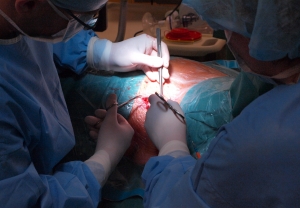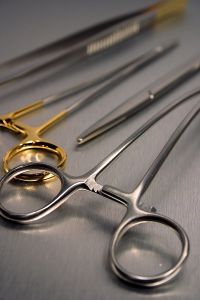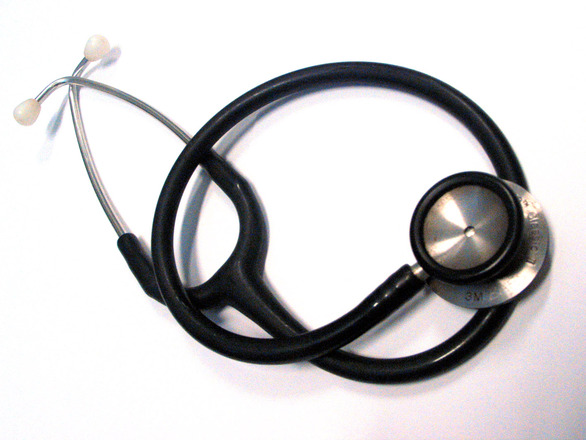EKO Sensible Eco Living Motion Sensor Trash Cans manufactured in China, imported by Costco Wholesale Corporation, of Issaquah, Washington and sold exclusively at Costco stores and Costco.com was recalled on July 17, 2015. The recall (number 15-742) involves approximately 367,000 trash cans which were sold between December 2013 and June 2015.
Continue reading
Improper Diagnosis Leads To Improper Treatment
If a doctor misdiagnoses a patient it’s a slippery slope of subsequent errors. Based on a doctor’s misdiagnosis the patient will not receive the proper care and treatment needed for their current condition. In many cases, a misdiagnosis can lead to prescriptions of medications that the patient does not actually need. In other cases, because of a doctor’s misdiagnosis a patient may not obtain the necessary subsequent care needed such as radiological studies or lab work to properly diagnose their actual condition.
Takata Airbag Recall – Floridians Most At Risk Due To Climate
Mark Rosekind, the head of the National Transportation Safety Association (NHTSA) will stop in Florida this week to urge Florida drivers to check whether their automobiles are included in the Takata Airbag Recall.
Continue reading
Medication Errors – Seemingly Small Mistakes That Can Be Lethal
We often go to the pharmacy, hand over the medication prescription given to us by our physician and assume that we will be given the proper medication. Not once do we take into consideration that the pharmacist will make a medication error.
There are a several types of medication errors that can occur that we should dedicate more time reviewing before assuming that the vial of medication you were handed is the proper medication you should take.
 Perhaps a simple yet safe way of cross-checking is by taking a picture of your medication prescription before handing it over to the pharmacist. That way, when you pick up your medication you can compare the information on the vial with that of the written prescription that was provided by your doctor. If there are any concerns or questions, you can ask the pharmacist right then and there prior to leaving home with that medication.
Perhaps a simple yet safe way of cross-checking is by taking a picture of your medication prescription before handing it over to the pharmacist. That way, when you pick up your medication you can compare the information on the vial with that of the written prescription that was provided by your doctor. If there are any concerns or questions, you can ask the pharmacist right then and there prior to leaving home with that medication.
Continue reading
Broken Hearted: West Palm Beach Hospital With Unusually High Death Rates For Pediatric Cardiac Surgeries
Recently, an investigative report from the national media blew the whistle on a West Palm Beach, Florida hospital that allowed underqualified and understaffed medical providers to perform heart surgeries on children and babies. The overall mortality rates of these children and babies was three times the national average which placed a spotlight on the deficiencies at the hospital. The revelations surrounding the St. Mary’s pediatric heart surgery department are both horrifying and disturbing. How is it possible that a hospital, presumed to be dedicated to the well-being and safety of its patients, be so ill-equipped for such a complex area of medicine? To make matters worse, those harmed by the failure of St. Mary’s to adhere to necessary standards are the most innocent and needy in our society.
Continue reading
Cosmetic Surgery: Sometimes An Elective Procedure Can Have Life Threatening Consequences
Because cosmetic surgery procedures are almost always elective surgery on the part of the patient, these types of cases are more difficult to litigate in front of a jury panel. Why? Because many jurors opine that in many cases, cosmetic surgery procedures are elective procedures to improve one’s appearance and not medically necessary or life- saving procedures. As such, when something goes wrong during these types of procedures, jurors scrutinize the case a little more, because many feel the patient put themselves into the situation by electing to have the procedure done when it may not have been medically necessary.

Nonetheless, cosmetic surgery whether elective or not, shall still be taken seriously and when medical care during these procedures go wrong there can be serious life threatening results.
Continue reading
Major New Decision in Florida Malpractice Law – North Broward Hospital District v. Kalitan
On July 1, 2015, the Fourth District Court of Appeals issued a major decision affecting medical malpractice injury cases.
In the case of North Broward Hospital District v. Kalitan, the court held that the arbitrary caps on damages in Florida Statute 766.118 to be unconstitutional in medical malpractice injury cases.

This decision was based in part on the Florida Supreme Court decision in McCall, et al v. United States of America which held that the caps were unconstitutional as applied to medical malpractice wrongful death cases.
The court further held that its decision was not limited to future cases but was also applicable to existing cases.
Continue reading
Defective Medical Device: Da Vinci Surgical Robots
The Da Vinci Surgical Robot, manufactured by Intuitive Surgical, Inc., is used in several medical specialties including: Urology, Gynecology, Cardiothoracic, Colorectal, Head & Neck, and General Surgery. Specifically, the Da Vinci Surgical Robot has been used for hysterectomies, prostate removal surgeries, gastric bypasses, gall bladder removals, and thyroid cancer surgeries. Unfortunately, numerous Da Vinci Surgical Robot procedures have led to lawsuits claiming patients have suffered serious life threatening injuries, and in some cases death. Said injuries include, but are not limited to, the following: peritonitis, sepsis, bleeding, perforated/punctured blood vessels, organs or arteries, burned/torn intestines, bowel injuries, bladder and ureteral injuries, and vascular injuries.

The Da Vinci Surgical Robot was designed as a minimally invasive way for surgeons to perform certain surgeries. One of the primary benefits was its ability to provide surgeons a greater range of motion with the use of a joystick-like control. However, compared to surgery performed by hand, many physicians are uncertain as to the benefits of the procedure. Specifically, the Da Vinci Surgical Robot has many significant disadvantages. Primarily, the sensory feedback upon which surgeons rely is gone. The Robot cannot discern whether body parts are firm, bony, soft, or hard. Without this information, the wrong body part may be accidentally cut. Studies have indicated that on average the robotic surgery takes longer and subject patients are more likely to have post-surgical complications. Moreover, as a result of the Da Vinci’s modernistic approach, many physicians lack the required training, and are permitted to use the machine unsupervised after only a few training sessions.
Continue reading
HEALTH WARNING: Contaminated Injections Linked to Fungal Meningitis Outbreak
Fungal Meningitis is an infection of the protective membranes of the brain and spinal cord. Over the last few months, a deadly fungal meningitis outbreak has swept across the United States. Recently, both CDC and FDA investigations have established that the outbreak is directly related to contaminated epidural steroid injections produced by the New England Compounding Center (NECC), in Framingham, Massachusetts. The specific drug manufactured by NECC is a steroid called methylprednisolone. Currently, over 200 people across 16 states, including Florida, have been diagnosed with fungal meningitis linked to the contaminated injections. As of November there have been 23 reported deaths.
The symptoms of fungal meningitis include, but are not limited to the following: fever; headache; stiffness of the neck; nausea and vomiting; photophobia (sensitivity to light); new onset of weakness or numbness in any part of the body; slurred speech; increased pain; redness; swelling at the injection site; and/or altered mental status. According to the CDC, the onset of symptoms in most patients has occurred from one to four weeks after receiving the infected epidural injection. However, please note longer and even shorter periods have been reported.
Continue reading
Unnecessary Cardiology Work Performed At HCA-Owned Hospitals

According to the New York Times article, “Doctors at Hospital Chain Giant Performed Unnecessary Cardiac Work, Increasing Profits”, from 2002 – 2010 cardiologists at several HCA-owned hospitals in Florida were unable to justify many of the procedures they were performing. Many of the allegations related to unnecessary cardiac catheterization procedures. The subject hospitals include, but are not limited to, Cedar Medical Center in Miami, Lawnwood Regional Medical Center & Heart Institute, and Regional Medical Center in Bayonet Point.
Specifically, at Lawnwood Regional Medical Center & Heart Institute, half of the cardiac catheterization procedures were determined to have been done on patients without significant heart disease. Currently the United States Attorney’s Office in Miami has requested information concerning the medical necessity of interventional cardiology services at 10 of HCA-owned hospitals.
It has been alleged that the aforementioned procedures were motivated by financial considerations. However, HCA denies said allegations and remains steadfast on its focus of quality patient care. Currently, it is not known how many procedures were performed, how many patients have died, or been injured as a result of the aforesaid unnecessary medical treatment. Nonetheless, it is apparent that the problems are widespread and reach beyond just one physician.
Ultimately, patients may suffer irreversible damage as a result of unnecessary cardiac catheterization procedures, and the longer patients wait to seek legal or medical aid, the more permanent and damaging the effects can become. If you have been the recipient of a cardiac catheterization procedure at a HCA-owned hospital in Florida during the last 10 years, and are suffering and/or experiencing any adverse health conditions, please feel free to call our Florida Cardiac Catheterization lawyers at Halberg & Fogg PLLC. for a free consultation.
Continue reading
 South Florida Injury Lawyer Blog
South Florida Injury Lawyer Blog









